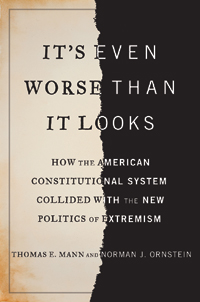CQ WEEKLY – IN FOCUS
Corrected May 17, 2012 – 12:04 p.m.
Authors Feel Heat for Blaming GOP
By Eliza Newlin Carney, CQ Staff
As veteran congressional scholars Thomas Mann and Norman Ornstein wrapped up a recent book signing at the Brookings Institution, Ornstein rattled off what’s scheduled next as the two promote their new book, “It’s Even Worse Than It Looks.”

|
||
|
“ ‘The Daily Show’ is now set for June 4,” Ornstein told Mann, a Brookings senior fellow who already has appeared with him on National Public Radio, the PBS NewsHour and MSNBC since the book’s May 1 release. Also on tap: A book party at Qorvis Communications; a debate at the American Enterprise Institute (AEI), where Ornstein hangs his hat; and tour stops in New York, Chicago and San Francisco.
“I’ve been doing this stuff, and Norm has, for over 40 years, and I’ve never had an experience like this,” Mann said. “It is stunning. It’s just stunning. It’s going to go on for a while. And it has gotten people’s attention, and prompted a lot of conversation, in a way that nothing I have ever written has.”
The media whirlwind has not all been celebratory. That is due to the book’s argument that Republicans bear a disproportionate share of the blame for dysfunction on Capitol Hill.
Even before the book’s publication, Ornstein and Mann triggered a mini-firestorm on the Internet and in the conservative blogosphere, thanks to a preview they published in The Washington Post on April 27. The lengthy Outlook section piece was titled “Let’s Just Say It: The Republicans Are the Problem.”
The book, subtitled “How the American Constitutional System Collided With the New Politics of Extremism,” also outlines institutional, redistricting and election overhauls to improve the system.
Strong reactions to it are no surprise. For decades, Mann and Ornstein have been the scholars most often quoted by the media on the subject of Congress. Their stature derives in part from their hewing to a scrupulously nonpartisan line.
Ornstein and Mann stuck out their necks in their book and Outlook article with salvos such as this about the Republican Party: “It is ideologically extreme; scornful of compromise; unmoved by conventional understanding of facts, evidence and science; and dismissive of the legitimacy of its political opposition.”
“This will be our last public appearance before entering a witness protection program,” Mann quipped at the May 9 Brookings forum. The standing-room-only event was moderated by Washington Post columnist E.J. Dionne, whose forthcoming book, “Our Divided Political Heart: The Battle for the American Idea in an Age of Discontent,” touches on similar themes.
“What an achievement it is to write a policy book about Washington that gets sold out on Amazon,” said USA Today Washington Bureau Chief Susan Page, who spoke at the forum with former Rep. Mickey Edwards, an Oklahoma Republican.
The book had already hit No. 13 on Amazon.com’s bestseller list the night before its official May 1 release, not far behind “The Hunger Games” by Suzanne Collins. The scholars’ book sold out within a week at Barnes & Noble, is selling briskly on electronic readers, and has 241,000 Facebook fans.
Ornstein and Mann are no strangers to the spotlight. Between them, they have written dozens of books and scholarly articles on such topics as Congress, campaigns, political money, redistricting, health policy and voting. They’ve lectured in the United States and abroad and collaborated on several books, including their recent indictment of Washington politics, “The Broken Branch: How Congress Is Failing America and How to Get It Back on Track.”
Authors Feel Heat for Blaming GOP
But unlike “The Broken Branch,” which took more than two years to write, “It’s Even Worse Than It Looks” was a four-month sprint that compressed edits and rewrites into about 50,000 words in a matter of weeks, and that Ornstein likened to “a Bataan march.” The book, with in its unvarnished indictment of the GOP, also departs from “The Broken Branch,” which did not lay blame on either party.
The book blames congressional GOP leaders for putting “party fealty ahead of problem-solving” during last summer’s debt limit debate, which it recounts in detail. The deal to raise the debt ceiling ultimately averted default but prompted Standard & Poor’s to downgrade the U.S. credit rating for the first time.

|
||
|
Ornstein and Mann heap special blame on two Washington figures: Newt Gingrich, former Republican House Speaker, and Grover Norquist, president of Americans for Tax Reform. Gingrich coarsened the political culture and perfected the strategy of year-round, partisan attacks, they say. Norquist, whose anti-tax pledge has been signed by all but a handful of Republican members of Congress, is held responsible for ongoing budget and deficit stalemates.
Norquist responded that the authors “expose their substantial ideological blinders when they claim that opposition to tax increases interferes with bipartisanship. Under what assumption is raising taxes and being bipartisan synonymous? Only in the mind of someone who believes that government can, should and will, constantly expand. Such people are not scholars or analysts or neutral observers — they are cheerleaders for the Left.”
Ornstein and Mann also argue that the news media have sugarcoated Republicans’ culpability and should spotlight it more plainly. The book runs through a list of political policies that Ornstein and Mann reject as “bromides” to avoid, including attempts to cultivate a third party, a constitutional amendment to balance the budget, term limits and public financing of elections.
More promising, they argue, would be election revisions such as modernizing the registration system and making voting mandatory; redistricting changes; open primaries; political money and lobbying transparency; and limits on the filibuster.
Taking On the GOP
The scholars’ institutional reform recommendations have been overshadowed by their critique of the GOP, which some argue ignores Democrats’ role in congressional dysfunction. For Ornstein, in particular, given his affiliation with the conservative-leaning AEI, the decision to take on the Republican Party was not easy.
“We have tried very scrupulously to be fair-minded and not take sides,” said Ornstein, a columnist for CQ’s sister publication, Roll Call. He noted that he used to pride himself following public appearances when audience members would tell him that they couldn’t tell which side he was on. “Writing this book was not an easy thing to do.”
Mann said that 90 percent of the emails that he and Ornstein have received, many of them from Republicans, have been positive, thanking the two for voicing concerns that also exist within the GOP. The recent Indiana primary that ousted Sen.
“Here was what a lot of people called an ‘emperor has no clothes’ moment,” said Ornstein, joining Mann for an interview following the Brookings forum. “People who were largely seen as figures of the Washington center, or the Washington establishment — however you want to frame it — were saying: ‘Wait a minute, here. This is not equivalent.’ And because we backed it up with some evidence, and it wasn’t just a polemic, it struck a nerve. And that, more than anything, I think has propelled the book.”
Their willingness to stake out a strong position, the two scholars said, reflects their growing alarm and even anger. Gridlock has gotten so bad that it could trigger economic instability, damage the Republican Party and block Congress from solving urgent national problems, they argue.
Authors Feel Heat for Blaming GOP
Mann said he and Ornstein “went from being discouraged to being angry.” Ornstein said his “sense of alarm really rose” when House Republicans initially blocked the 2008 Troubled Asset Relief Program following the global financial crisis. Had TARP not won approval, Ornstein added, “it could have brought a global depression, a global credit freeze that would have caused the whole process to collapse for a very substantial period of time.”
Both men credited Arthur Brooks, the president of AEI, and Strobe Talbott, Brookings’ president, for standing by them amid critiques from the right. In addition to thousands of comments that run the gamut on The Washington Post website — the paper stopped counting at 5,000 — the two have drawn hostile blog postings.
“It must be said: These two have completely lost their bearings,” AEI fellow Peter Wallison said on the Enterprise Blog. Another AEI fellow, Steven Hayward, will debate Ornstein at the think tank in mid-June. The notion that journalists have been too evenhanded in their coverage strikes many Republicans as laughable.
“Heaven forbid that Republicans would grow a spine and say ‘stop’ to the endless expansion of the state,” Hayward wrote in the Daily Caller. “Yet that is the real complaint of my AEI colleague Norm Ornstein and his collaborator Thomas Mann in their new attack on Republicans.”
Although Mann and Ornstein acknowledge that Democrats, too, have manipulated the process and the rules when it was in their interest, they argue that Democrats cooperated with Republicans on issues such as education and welfare reform. Critics counter that Democrats did not move an inch when President George W. Bush proposed Social Security changes, for one. At bottom, say many Republicans, the two scholars’ real beef appears to be with American voters.
“The sharp rightward move of the Republican Party seems to reflect the electorate,” said David Norcross, former general counsel of the Republican National Committee (RNC) and a partner with Blank Rome.
“If there are sharp disagreements, and they are reflected in the polls, then how can you lay the blame for it all on one party?” Norcross said. “The [Republican] Party seems to be satisfying an awful lot of voters, and may in fact satisfy enough voters to win the presidency.”
Still, official GOP reaction has been relatively muted — a testament to the good will that Ornstein and Mann have built over the years. The RNC did not return calls seeking comment, and one conservative opinion leader lit into the book — but declined to speak for the record.
“It’s fascinating how quiet, if you will, the Republican Party people on the Hill, and so on, have been,” Mann said. “I haven’t heard anyone attack us among elected Republicans.”
As Mann and Ornstein gear up for another round of book promotion, which will include a second article for The Washington Post, that may change — thrusting the two scholars still further into the media fray.
Eliza Newlin Carney is a Roll Call staff writer.
FOR FURTHER READING: Party unity vote study, CQ Weekly, p. 111; Republican Party tensions, p. 94; debt limit repercussions, 2011 CQ Weekly, p. 2426, Norquist role, p. 2382.
First posted May 12, 2012 12:07 p.m.
Correction
Clarifies Ornstein's relationship to the Republican Party. He is a registered Democrat.